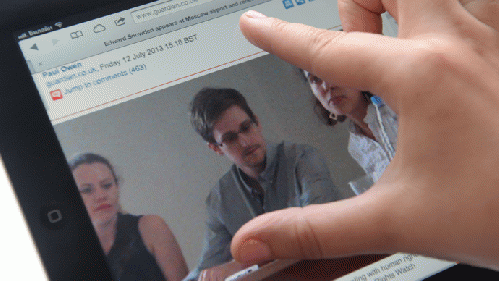Former NSA agent, Edward Snowden, has called on an EU Parliament committee to provide protection for whistleblowers and "create better channels" for them to inform. The committee is currently holding an inquiry into the "Prism scandal."
The inquiry involves a series of special hearings looking at specific aspects. On September 30 it heard evidence from the whistleblowers, including the UK's Annie Machon, who revealed an MI6 plot to assassinate Libyan leader, Muammar Gaddafi, in February 1996 -- and Edward Snowden. However, the latter was not able to attend in person.
As US fugitive NSA-leaker, Snowden submitted testimony to the European Parliament's civil liberties committee (LIBE), saying "the surveillance of whole populations rather than individuals threatens to be the greatest human rights challenge of our time."
"I thank the European parliament and the LIBE committee for taking up the challenge of mass surveillance," Snowden wrote in a statement read by Jesselyn Radack of the Government Accountability Project before the European Parliament's Committee.
In "returning public knowledge to public hands," Snowden has made a plea not to rely on "individual sacrifice," which in his case resulted in "persecution and exile."
"We must create better channels for people of conscience to inform not only trusted agents of government but independent representatives of the public outside government," Snowden, who now lives in Moscow, wrote.
Snowden blamed "a culture of secrecy" for removing from society "the opportunity to determine the appropriate balance between the fundamental right of privacy" and "governmental interest in investigation." He says that such decisions should be made by people, only "after full, informed and fearless debate."
Snowden explained his reasons in the statement for leaking documents, saying he did it "with the sole intention of making possible" a debate about changes in governments' surveillance programs.
"We see emboldened courts that are no longer afraid to consider critical questions of national security," he writes. "We see brave executives remembering that if the public is prevented from knowing how they are being governed, the necessary result is that they are no longer self-governing. And we see the public reclaiming an equal seat at the table of government."
Meanwhile, Edward Snowden has been nominated for this year's Sakharov Prize for Freedom of Thought. Snowden is wanted in the US on espionage charges, after leaking secret documents revealing the US surveillance program PRISM used to gather private data. In August, he was granted temporary asylum in Russia, where he currently resides.





